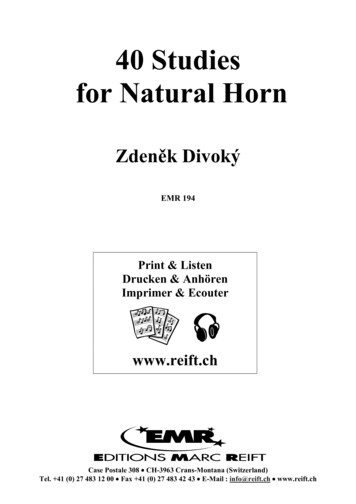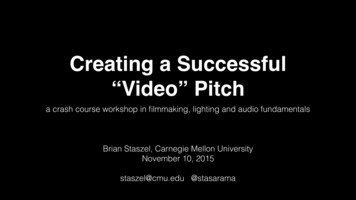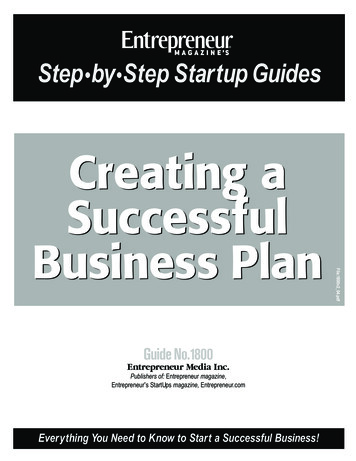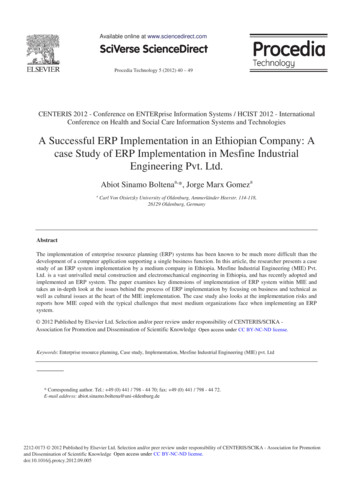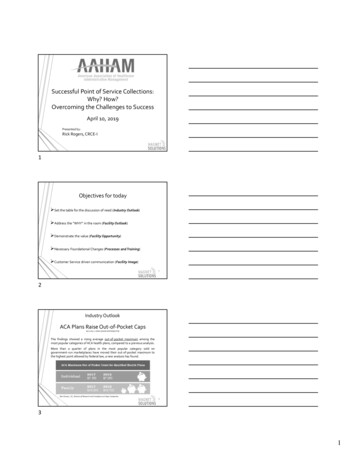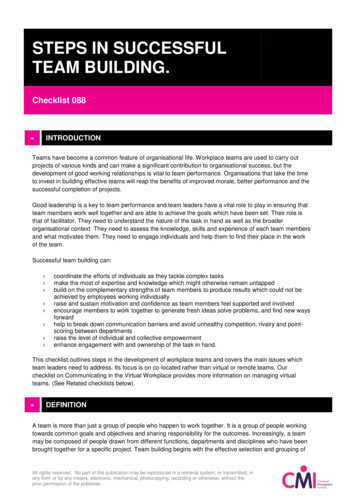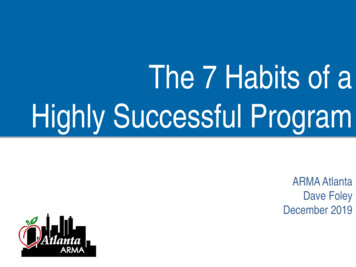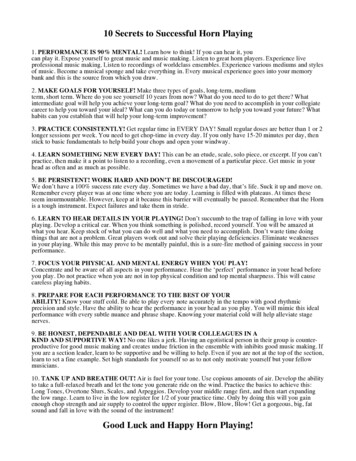
Transcription
10 Secrets to Successful Horn Playing1. PERFORMANCE IS 90% MENTAL! Learn how to think! If you can hear it, youcan play it. Expose yourself to great music and music making. Listen to great horn players. Experience liveprofessional music making. Listen to recordings of worldclass ensembles. Experience various mediums and stylesof music. Become a musical sponge and take everything in. Every musical experience goes into your memorybank and this is the source from which you draw.2. MAKE GOALS FOR YOURSELF! Make three types of goals, long-term, mediumterm, short term. Where do you see yourself 10 years from now? What do you need to do to get there? Whatintermediate goal will help you achieve your long-term goal? What do you need to accomplish in your collegiatecareer to help you toward your ideal? What can you do today or tomorrow to help you toward your future? Whathabits can you establish that will help your long-term improvement?3. PRACTICE CONSISTENTLY! Get regular time in EVERY DAY! Small regular doses are better than 1 or 2longer sessions per week. You need to get chop-time in every day. If you only have 15-20 minutes per day, thenstick to basic fundamentals to help build your chops and open your windway.4. LEARN SOMETHING NEW EVERY DAY! This can be an etude, scale, solo piece, or excerpt. If you can’tpractice, then make it a point to listen to a recording, even a movement of a particular piece. Get music in yourhead as often and as much as possible.5. BE PERSISTENT! WORK HARD AND DON’T BE DISCOURAGED!We don’t have a 100% success rate every day. Sometimes we have a bad day, that’s life. Suck it up and move on.Remember every player was at one time where you are today. Learning is filled with plateaus. At times theseseem insurmountable. However, keep at it because this barrier will eventually be passed. Remember that the Hornis a tough instrument. Expect failures and take them in stride.6. LEARN TO HEAR DETAILS IN YOUR PLAYING! Don’t succumb to the trap of falling in love with yourplaying. Develop a critical ear. When you think something is polished, record yourself. You will be amazed atwhat you hear. Keep stock of what you can do well and what you need to accomplish. Don’t waste time doingthings that are not a problem. Great players work out and solve their playing deficiencies. Eliminate weaknessesin your playing. While this may prove to be mentally painful, this is a sure-fire method of gaining success in yourperformance.7. FOCUS YOUR PHYSICAL AND MENTAL ENERGY WHEN YOU PLAY!Concentrate and be aware of all aspects in your performance. Hear the ‘perfect’ performance in your head beforeyou play. Do not practice when you are not in top physical condition and top mental sharpness. This will causecareless playing habits.8. PREPARE FOR EACH PERFORMANCE TO THE BEST OF YOURABILITY! Know your stuff cold. Be able to play every note accurately in the tempo with good rhythmicprecision and style. Have the ability to hear the performance in your head as you play. You will mimic this idealperformance with every subtle nuance and phrase shape. Knowing your material cold will help alleviate stagenerves.9. BE HONEST, DEPENDABLE AND DEAL WITH YOUR COLLEAGUES IN AKIND AND SUPPORTIVE WAY! No one likes a jerk. Having an egotistical person in their group is counterproductive for good music making and creates undue friction in the ensemble with inhibits good music making. Ifyou are a section leader, learn to be supportive and be willing to help. Even if you are not at the top of the section,learn to set a fine example. Set high standards for yourself so as to not only motivate yourself but your fellowmusicians.10. TANK UP AND BREATHE OUT! Air is fuel for your tone. Use copious amounts of air. Develop the abilityto take a full-relaxed breath and let the tone you generate ride on the wind. Practice the basics to achieve this:Long Tones, Overtone Slurs, Scales, and Arpeggios. Develop your middle range first, and then start expandingthe low range. Learn to live in the low register for 1/2 of your practice time. Only by doing this will you gainenough chop strength and air supply to control the upper register. Blow, Blow, Blow! Get a gorgeous, big, fatsound and fall in love with the sound of the instrument!Good Luck and Happy Horn Playing!
Recommended Literature for French HornEtude/ Technique BooksThe following is a list of some books for study on the Horn. They are listed according to skill level base on factorssuch as range/tesitura, leaps, rhythms utilized, keys/accidentals, and incorporation of special techniques (trills,stopping, etc.). It should be noted that these classifications are merely a guide for finding appropriate literature.Many of the books listed could be classified in more than one category and contain exercises which can be useful toplayers at any level. Also listed are some books for developing special techniques on the Horn.Beginning (novice – 1 year training):*Pottag-Hovey – Method for French Horn, book 1Robert Getchell – First Book of Practical Studies for HornRubank Elementary Method by J.E. Skornicka/Hal LeonardIntermediate (Jr. high – early High School):Erwin Miersch - Melodious Studies for French HornMaxime-Alphonse – 200 Melodic and Gradual Studies volume 1Rubank Supplementary Studies by R.M. Endresen/Hal Leonard*Rubank Advanced Method, French Horn volume 1 by Voxman & GowerAdvanced (mid High School, College and beyond):Bach, J.S. – Cello SuitesBitsch – 12 Etudes*Bordogni/Rochut – Melodious Etudes, volumes 1, 2 & 3Concone/Sawyer – Lyrical Studies for Trumpet or Horn*Gallay – 12 Second Horn Etudes, Op. 57Gallay – 22 Studies for HornGallay – 24 Studies for Horn*Gallay – 40 Preludes opus 27 (including unmeasured preludes)Gallay – 12 Grands Caprices, Op. 32Gallay – 12 Grands Etudes Brillantes, op. 43*Kling – 40 Characteristic Etudes for French Horn, edited Sansone*Kopprasch – 60 Selected Studies for HornKopprasch/Yancich – 90 Etudes (complete Kopprasch)Maxime-Alphonse – 200 Melodic and Gradual Studies, volumes 2 - 6Müller – 12 EtudesMüller – 34 Studies, opus 64*Pottag – Preparatory Melodies to Solo Work for French HornReynolds – 48 EtudesSchantl – Grand Theoretical and Practical Method for the Valved HornTechnique Studies:William Brophy – Technical Studies for Solving Special Problems on the HornH.L. Clarke – Technical Studies for the CornetGallay – Daily Exercises for HornVictor Salva – 240 Double and Triple Tonguing ExercisesFred Teuber – Progressive Studies in Flexibility and Range DevelopmentFor Natural Horn (hand-horn):F. Duvernoy – Method for HornGabler – 140 Naturhorn EtüdenFreidberg – Naturhorn SchuleH. Kling – Horn Schule - Methode Pour le CorSchantl – Grand Theoretical and Practical Method for the Natural Horn
Books on the Horn and Horn Playing“The Art of French Horn Playing” by Philip Farkas“The Art of Brass Playing” by Philip Farkas“The Art of Musicianship” by Philip Farkas“Photographic Study of 40 Virtuoso Horn Players’ Embouchures” by Philip Farkas“The Horn Handbook” by Verne Reynolds“Horn Technique” by Gunther Schuller“Horn” by Barry Tuckwell“The Horn” by Kurt Janetzsky and Bernard Brüchle"The Early Horn" by John Humphries“Mastering the Horn’s Low Register” by Randy Gardner“Collected Thoughts on Teaching & Learning, Creativity & Horn Performance” by Douglas Hill“Extended Techniques for the Horn” by Douglas Hill“Living Dangerously with the Horn” by David M. Kaslow"Philip Farkas: Legacy of a Master" by M. Dee StewartSolo Literature for HornEssential Solos:Listed here is the solo literature most requested for University/ Professional Auditions.Beethoven-Sonata, Op. 17Dukas-VillanelleGlazunov-Reveries, Op. 24Hindemith-Sonata for Horn and PianoW.A. Mozart-Concerto No. 1 in D Major, K.412-Concerto No. 2 in Eb Major, K.417-Concerto No. 3 in Eb Major, K.447-Concerto No. 4 in Eb Major, K.495Saint-Saens-Morceau de Concert-Romance, Op. 36F. Strauss-Concerto, Op. 8R. Strauss-Concerto No. 1, Op. 11Selected Solo literature organized by Historical Period:BAROQUECorelli: Sonata in F Major; Sonata in g minorHandel, arr. Reynolds: Third SonateSenaille-Eger:Allegro SpiritosoTelemann: Concerto in D;Adagio and PrestoCLASSICALBeethoven: Sonata, Op. 17Danzi: Sonata in F; Sonata in E-flatHaydn, Joseph: Concerto No. 1 in DConcerto No. 2 in DHaydn, J. Michael: ConcertinoKrufft: Sonate in E MajorMozart, WA: Concerto No. 1 K. 412; Concerto No. 2 K. 417;Concerto No. 3 K. 447; Concerto No. 4 K. 495;Concert Rondo K. 371Rossetti: Concerto in Eb MajorStamitz, K: Concerto in E-flat
ROMANTICChabrier: LarghettoCherubini: Sonata No. 1 (F major) and Sonata No. 2 (D minor)Glazunov, A: Reveries, op. 24Gliere: Concerto in Bb Major, op. 91; Intermezzo, op. 35; Romance, Op. 36Lorenz: Fantasie for French HornMercadante: ConcertoNielsen, Carl: Canto SeriosoRossini, G: Prelude, Theme et Variation; Introduction, Andante et AllegroSaint-Saens: Morceau de Concert; Romance, op. 36; Romance, op. 67Schumann: Adagio and AllegroStrauss, F: Concerto, Op. 8; Nocturne, Op. 7;Theme and Variations;Seaside ImpressionsStrauss, R: Concerto no. 1, Op. 11; Andante;Concerto no. 2 in EbWeber: Concertino20th CENTURY/ CONTEMPORARYAbbott, Alan: Alla CacciaAdler, Samuel: Sonata for Horn & PianoArnold: Fantasy for HornAtterberg: KonzertBakaleinikoff:Canzona;CavatinaBernstein, L: Elegy for Mippy IBozza, Eugene: En Foret;En IrelandeDukas, P: VillanelleHamilton: AriaHeiden: SonataHindemith: Concerto;Sonate;Alto Horn Sonate;Jacob, Gordon: ConcertoLarrson: RomanzaMusgrave: Music for Horn and PianoThe Golden EchoNelhybel, V: Scherzo ConcertantePersichetti: Parable for Solo HornPlanel: LegendeSchickele, P: What Did You Do Today at Jeffreys HouseTomasi, H: Chant CorseVinter, Gilbert: Hunter’s MoonWilder: Sonata No. 1, 2, and 3;Suite No. 1 and 2
Horn Orchestra Literature Short-ListBach, Johann SebastianBrandenburg Concerto no. 1(1, 2)Beethoven, Ludwig vonFidelio - overtureSymphony no. 3 “eroica”Symphony no. 7Symphony no. 8Symphony no. 9 “choral”(2)(1, 2)(1, 2)(1, 2)(1, 4)Brahms, JohannesSymphony no. 1Symphony no. 3Variations on a Theme of Haydn(1, 2, 3, 4)(1)(2)Dvorák, AntoninConcerto for CelloSymphony no. 9, op.95 “From the New World”(1)(1, 2, 3, 4)Franck, CesarSymphony in D minorHaydn, Franz JosephSymphony no. 31 “mit dem Honrsignal”Liszt, FranzLes PreludesMahler, GustavSymphony no. 1Symphony no. 3Symphony no. 5Mendelssohn, FelixA Midsummer Night’s Dream- nocturneSymphony no. 3 “scottish”(1, 2)(3, 4)Mozart, Wolfgang AmadeusSymphony no. 40 in G minor, k.550(1, 2)Mussorgsky/RavelPictures at an ExhibitionProkofiev, SergeiRomeo and Juliet Suite no. 2Ravel, MauriceBoleroConcerto pour piano et orchestre in GPavan for a Dead Princess(1, (2))(1, 2, 3)(4)(1, 2, 4)(1, 2, 3, 4)(corno obligato)(1)(1, 2, 3, 4)(1)(1)Rossini, Gioacchino“Semiramide” overture(1, 2, 3, 4)Schumann, RobertSymphony no. 3 “Rhenish”Shostakovich, DmitriSymphony no. 5(1, 2, 3, 4)Strauss, RichardDon JuanDon QuixoteTill Eulenspiegels Lustige StreicheEin Heldenleben(1, 2, 3, 4)(2, 4)(1, 3)(1, 2, 3, 4)Tchaikovsky, Peter IlyichSymphony no. 4Symphony no. 5(1, 2, 3, 4)(1)Wagner, Richard“Götterdämmerung” - Rhine Journey (short call)”Das Rheingold”, introduction (prelude)Weber, Carl Maria von“Der Freischütz” - Overture“Oberon”, Overture(1, 3)(1)(2, 4, 8)(1, 2, 3, 4)(1)
Orchestra Literature ExtendedAdamsThe Chairman Dances(1, 4)Bach, Johann SebastianBrandenburg Concerto no. 1Mass in B Minor(1, 2)(1)Beethoven, Ludwig von*Fidelio - overture**Symphony no. 3 “eroica”*Symphony no. 6 “pastoral”**Symphony no. 7*Symphony no. 8**Symphony no. 9 “choral”(2)(1, 2)(1)(1, 2)(1, 2)(1, 4)Bellini“I Capuleti ed I Montechi,” Act I (“oh, quante volte ”)Berg, Alban“Wozzeck”Berlioz, Hector*Romeo and Juliet, “Queen Mab Scherzo”Symphonie Fantastique, Op. 14Roman Carnival overture(3)(4)Bernstein, LeonardOn the Waterfront SuiteBizet, G.“Carmen,” Act III (Michael’s aria)Borodin, AlexanderPolovetsian DancesBrahms, Johannes*Concerto for Piano no.1*Concerto for Piano no.2**Symphony no. 1*Symphony no. 2*Symphony no. 3*Symphony no. 4*Variations on a Theme of HaydnBruckner, Anton*Symphony no. 4 “romantic”Symphony no. 7Symphony no. 9Debussy, ClaudeLa MerPrelude to the Afternoon of a FaunDonizetti“Lucia di Lammermoor,” Act II & IIIDukasThe Sorcerer’s ApprenticeDvorák, AntoninConcerto for CelloSymphony no. 9, op.95 “From the New World”Franck, CesarSymphony in D minorHandel, G.Oratorio “Judas Maccabaeus”“Guilio Cesare” ‐ Act I (“va, tacito ”)‐ Act III (“sinfonia ”)Haydn, Franz Joseph*Symphony no. 31 “mit dem Honrsignal”(1, 2, 3)Holst, GustavThe Planets(1, (2))(1, 3)(1, 3)(1, 2, 3, 4)(1)(1)(1, 2, 3, 4)(2)(1)(1)(1)(1, (2))(1, (2))(1)(1, 2, 3, 4)(1, (2))
Humperdink, E.“Hänsel und Gretel” PreludeLiszt, FranzLes PreludesMahler, Gustav*Symphony no. 1Symphony no. 3Symphony no. 4*Symphony no. 5Symphony no. 7Symphony no. 9Mendelssohn, Felix*A Midsummer Night’s Dream- nocturne*Symphony no. 3 “scottish”Symphony no. 4 “italian”(1, 2)(3, 4)Mozart, Wolfgang AmadeusSymphony no. 25Symphony no. 29, k.201Symphony no. 40 in G minor, k.550“Cosi Fan Tutte” Act II, aria no. 25 (“per pieta ”)“Le Nozze di Figaro” Act I & IV(2)(1, 2)(1, 2)Mussorgsky/RavelPictures at an ExhibitionProkofiev, SergeiRomeo and Juliet Suite no. 2Puccini“Tosca” Act III, introductionRavel, MauriceBolero*Concerto pour piano et orchestre in GPavan for a Dead PrincessDaphnis and Chloé(4)(1, 2, 4)(1, 2, 3, 4)(1)(corno obligato)(1)(1, 2)(1)(1, 2, 3, 4)(1)(1)(1, 2, 4)RespighiPines of RomeRoman FestivalsRimsky-KorsakoffScheherazadeCapriccio EspagnoleRossini, Gioacchino“Semiramide” overtureSaint‐Saens, CamilleSymphony no. 3Schoenberg, ArnoldChamber Symphony no. 1, op. 9(1, 2)Schubert, FranzSymphony no. 9 (“Great” C major)(1, 2)Schumann, RobertSymphony no. 3 “Rhenish”(1, 3)Shostakovich, Dmitri**Symphony no. 5(1, 2, 3, 4)Strauss, Richard**Don Juan*Don QuixoteSymphonia Domestica**Till Eulenspiegels Lustige Streiche**Ein Heldenleben“Salomé”Le Bourgeois Gentilhomme“Der Rosenkavalier”(1, 2, 3, 4)(2, 4)(1, 4)(1, 3)(
*Kling – 40 Characteristic Etudes for French Horn, edited Sansone *Kopprasch – 60 Selected Studies for Horn Kopprasch/Yancich – 90 Etudes (complete Kopprasch) Maxime-Alphonse – 200 Melodic and Gradual Studies, volumes 2 - 6 Müller – 12 Etudes Müller – 34 Studies, opus 64 *Pottag – Preparatory Melodies to Solo Work for French Horn Reynolds – 48 Etudes Schantl – Grand .
